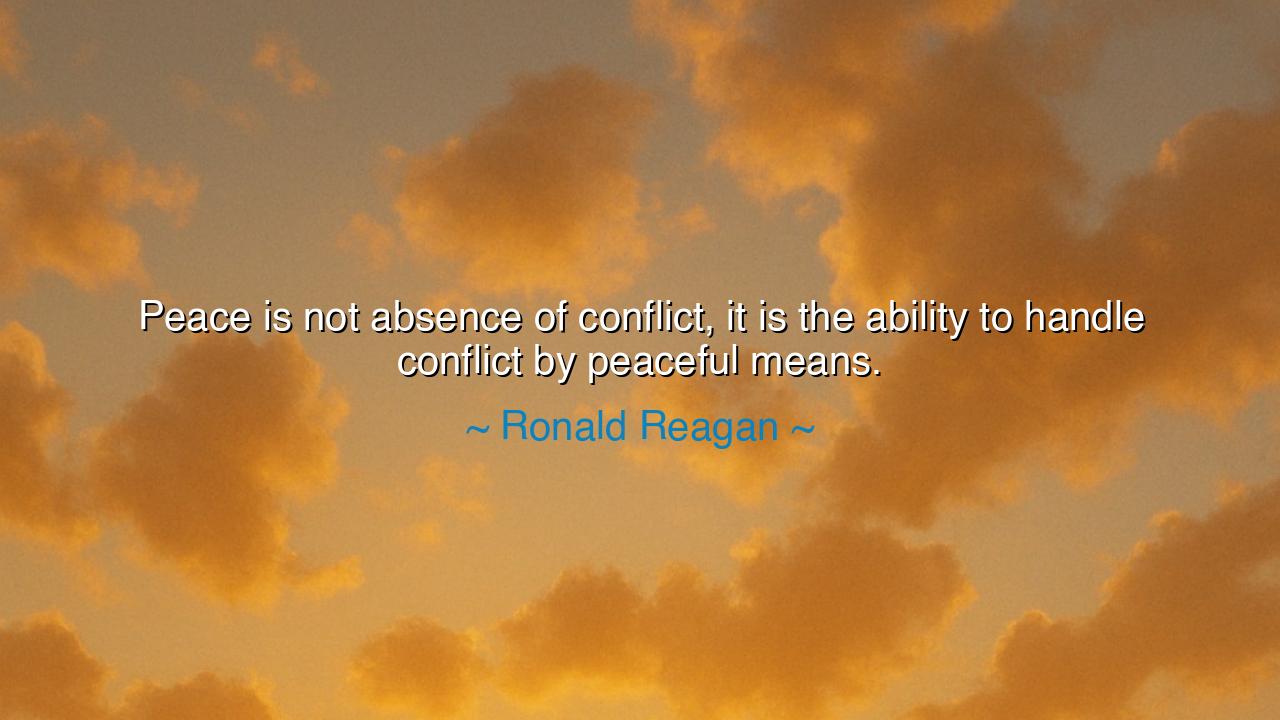
Peace is not absence of conflict, it is the ability to handle
Peace is not absence of conflict, it is the ability to handle conflict by peaceful means.






So spoke Ronald Reagan, a leader of his age, when he declared: “Peace is not absence of conflict, it is the ability to handle conflict by peaceful means.” These words are carved with the weight of experience, for Reagan led in a time when the shadow of nuclear war loomed large, and when the rivalry of nations threatened the very survival of mankind. Yet he saw that true peace is not a fragile silence built on fear, nor the simple void of strife, but the strength of men and women to resolve their differences without surrendering to violence.
For conflict is as old as humanity. Brothers have quarreled, cities have clashed, and nations have fought since the dawn of time. To imagine a life without conflict is to imagine a world without freedom, without choice, without the fire of diverse hearts. Conflict will come, as storms come to the sea. What matters is not the storm itself, but how the sailor steers his ship. To meet conflict with anger is to sink into chaos; to meet it with peaceful means is to transform the tempest into a passage toward greater wisdom.
The ancients bore witness to this truth. Consider King Solomon, who faced a dispute between two women over the life of a child. He might have chosen harshness or judgment by force, yet he sought instead the way of wisdom. His peaceful solution revealed truth without bloodshed, restoring justice and harmony. So too, Reagan’s words remind us that the greatest strength is not found in the clenched fist, but in the open hand guided by courage and restraint.
History offers us other mirrors. After the Second World War, the nations of Europe might have drowned themselves in vengeance. Instead, leaders built institutions of cooperation—alliances of trade, dialogue, and shared purpose. By handling conflict through peaceful means, they turned centuries of rivalry into decades of stability. Contrast this with the Treaty of Versailles after the First World War, where punishment and humiliation replaced understanding, and the seeds of another war were sown. From these examples, we see clearly that peace is not passive—it is active, requiring patience, discipline, and vision.
Reagan himself embodied this teaching during the Cold War. The confrontation between the United States and the Soviet Union was filled with suspicion, competition, and danger. Yet it did not descend into open war, for dialogue, diplomacy, and the pursuit of arms reduction allowed two great powers to step back from the brink. The world was not free of conflict—but it was saved by the commitment to address that conflict without fire and steel. This is the heart of his words: peace endures when men learn to master their conflicts, not by denying them, but by taming them.
The lesson for us is eternal: we cannot flee from conflict, but we can choose how we face it. In families, in communities, in nations, conflict will arise—disputes of will, differences of belief, clashes of interest. The question is not whether they will come, but whether we shall meet them with rage or with reason, with violence or with compassion. To choose peaceful means is not weakness; it is the highest strength, for it demands patience, restraint, and the courage to put unity above pride.
Practically, this calls us to cultivate habits of peace. Listen before answering in anger. Seek compromise where pride tempts you to stand unyielding. In times of disagreement, ask not only, “How do I win?” but also, “How do we all move forward together?” Build bridges with words, not walls with silence. For in daily acts of peacemaking, the larger destiny of nations is reflected.
Thus, Reagan’s wisdom endures: “Peace is not absence of conflict, it is the ability to handle conflict by peaceful means.” Let us take these words as a guide for our age and all ages, for they remind us that the true test of humanity is not whether conflict arises, but whether we can transform it into understanding. And those who master this art will be remembered not only as leaders of their time, but as builders of harmony for generations yet to come.






AAdministratorAdministrator
Welcome, honored guests. Please leave a comment, we will respond soon